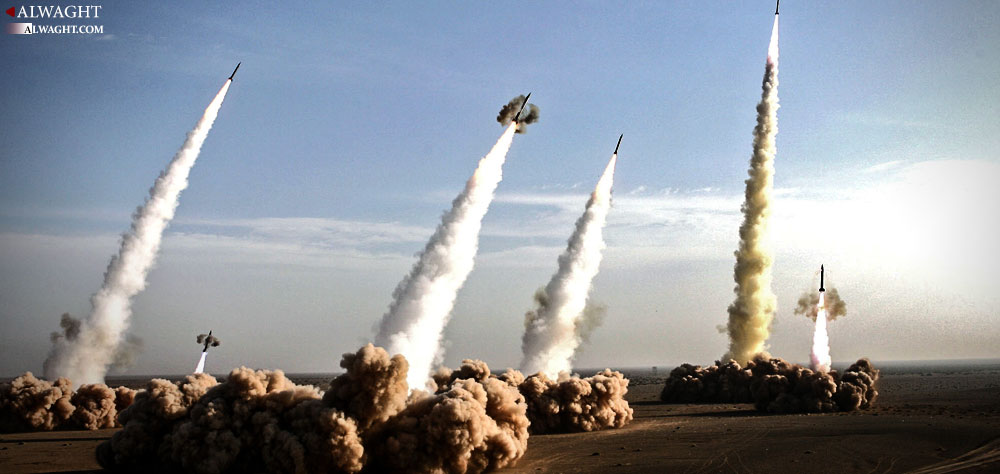Alwaght- Iran’s Leader Sayyed Ali Khamenei attended on Wednesday attended the graduation ceremony of IRGC cadets at Imam Hussain University, the country’s leading military academy.
The Leader watched the military parade of the cadets of the Islamic Revolution Guard Corps (IRGC). He was shown a live footage of two missiles fired by the country’s missile forces towards sea targets in Sea of Oman.
The IRGC in past few months tested a ballistic missile hitting a target also in the same sea.
The new missile tests by the IRGC along with the army forces appear to show that the Islamic Republic is holding new significant plans to tighten its control over the Sea of Oman coasts and other strategic areas of the country.
The missile tests conducted by the Iranian military forces have frequently been target of criticism of the regional and international powers which also find them as an excuse to impose economic sanctions on the West Asian country. The media close to the Western powers use the tests to spread Iranophobic propaganda across the region, a policy helping them sell arms worth of billions of dollars to the Iran’s rivals, especially the Persian Gulf Arab regimes.
A senior White House official, who spoke to Reuters on condition of anonymity, said on Friday the US is close to ink arms deals with Saudi Arabia, saying that the arm package could end up surpassing more than $300 billion over a decade, a week ahead of President Donald Trump's planned visit to Riyadh.
International powers' media war against the Islamic Republic comes while Tehran insists that it develops its military might to make sure that its security is guaranteed, an outcome facilitating domestic economic boost and enabling it to have its own word on the global stage. The Iranian leaders argue that the primary precondition to realize progress in the country is to provide security through firmly facing the internal and external threats. If a nation fails to build military deterrence in front of the hostile sides, it at any time can be subject to foreign hostilities, and once this takes place, its power to promote its economic potentials will face challenges.
Iran's military industries are setting high on their agenda expansion of their missile capabilities including developing a wide range of short, mid, and long-range surface-to-surface missiles, as well as air defense systems. The West's lashing out at the Iranian missile program is coming while it equips its forces with cutting-edge missiles and even provides its regional allies with them.
The Iranian missile tests' significance comes from the fact that the Islamic Republic is facing a wide range of enemies due to its revolutionary nature. The US-led West and its regional allies' antagonism towards Iran has been effective in encouraging Iran increase its military capabilities for total deterrence. Furthermore, the regional developments and provocative measures of some of Tehran rivals even double the importance of such missile tests.
According to the Stockholm International Peace Research Institute (SIPRI), Saudi Arabia, a key rival of the Islamic Republic in the region, took India’s place as the world's largest weapons importer in 2014. The kingdom’s rulers bought nearly $6.4 billion worth of new military equipment on the pretext of the need to build their own deterrent power in the face of the so-called Tehran military threats. This was equal to 54 percent increase in arms purchases of Riyadh. Saudi Arabia also has missiles with 3,000 kilometers range, and experts suggest that with regard to the kingdom’s foreign policy their primary target is Iran, especially that the Saudis imagine no other regional enemy but Iran. This notion was even promoted as after the 2011 Arab uprisings, Riyadh improved relations with Tel Aviv, Iran's archenemy, and even set up an unannounced alliance with the Israelis against Tehran.
Another potential threat to Iran is the presence of the US naval vessels in the Sea of Oman which poses a potential risk to the Iranian national security, and Iran sees no other way but to hold long-range missiles to stand against them.
With all these in mind, developing the missile capabilities for deterrence and for striking back, if the need arises, looks quite necessary for the Islamic Republic. Saudi Arabia made it clear that it spares no efforts to deal a blow to Iran. Provoking sectarian unrest in Iran’s southeastern province of Sistan and Baluchestan and in other border areas of the country show that they are convinced of the Iranian power to respond, otherwise they could strike first long ago.
Additionally, the growing threats from rise of terrorist groups in past few years that aim at disrupting the political rule in the regional countries urge Tehran to build enough of short and mid-range rockets.
Still another reason Iran cites for its missile development program is lack of fair international justice mechanism. The Iranians take as an example the biased function of the United Nations Security Council in dealing with eight years of Saddam Hussein's war against Iran in the 1980s, arguing that no much hope can be set on the international community's proper responses to violations against sovereign states. Despite existence of international organizations for de-confliction, the reliance on self power and defense remains the key to protection of sovereignty.
With this in mind, if Iran halts its missile capabilities development, not only diplomacy fails to remove the sensitivity of the rivals to Iran’s rise as a regional power but also Iranian territories could come under possible direct military hostilities from the opponents.



























